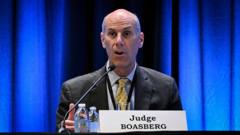The proposal for Gazans to leave their homes raises ethical questions and concerns over a potential humanitarian crisis.
Netanyahu's Controversial Stance on Gaza Migration Sparks Debate

Netanyahu's Controversial Stance on Gaza Migration Sparks Debate
Israel's Prime Minister aligns with Trump's vision for Gaza's future amidst critiques of 'voluntary' migration.
In a significant development regarding the ongoing Israeli-Palestinian conflict, Israeli Prime Minister Benjamin Netanyahu recently reaffirmed the controversial proposal for the "voluntary" migration of Palestinians from Gaza, a subject brought to light during his meeting with U.S. President Donald Trump. During the April 9, 2025 press conference, Netanyahu appeared undeterred by the criticisms surrounding the idea, which was initially introduced during a previous Oval Office meeting.
President Trump, who seemed to shift his focus away from the Gaza issue, expressed a sense of detachment, discussing various other policies including U.S. border regulations and trade tariffs. Netanyahu, however, seized the opportunity to remind the press of their discussions about transforming the Gaza Strip into a more hospitable environment, effectively outlining a vision of relocating the Palestinian population—approximately two million individuals—out of the ravaged area.
While Netanyahu insists that all actions would be on a "voluntary" basis, critics are quick to highlight the challenges of such a claim, especially considering the significant destruction of homes and infrastructure in Gaza. Given the dire circumstances, some argue that the concept of voluntary migration feels more coercive than genuine consent.
After Trump's initial announcement, Israeli Defense Minister Israel Katz acted swiftly, establishing a dedicated office within the ministry to oversee the migration plan. This indicates a serious intent by the Israeli government to explore potential options for Gazans' relocation, with Katz appointing senior official Yaakov Blitshtein to manage the initiative.
As the international community watches closely, the proposal has reignited discussions about the legality and ethics of such actions, raising alarm among humanitarian organizations and observers who fear a looming disaster if the plan proceeds without due consideration for the affected population.




















